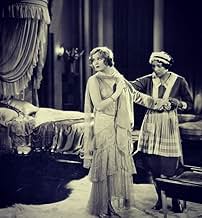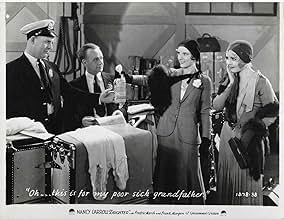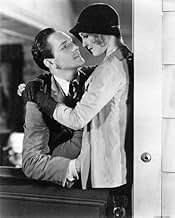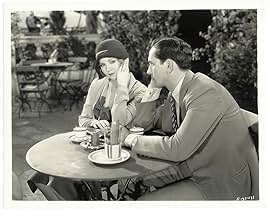अपनी भाषा में प्लॉट जोड़ेंA former chorus girl weds a millionaire after the composer she loves leaves. Meanwhile, she strings along an artist in love with her. When the composer returns, she struggles with her needs ... सभी पढ़ेंA former chorus girl weds a millionaire after the composer she loves leaves. Meanwhile, she strings along an artist in love with her. When the composer returns, she struggles with her needs for security vs love. High jinks and drama ensue.A former chorus girl weds a millionaire after the composer she loves leaves. Meanwhile, she strings along an artist in love with her. When the composer returns, she struggles with her needs for security vs love. High jinks and drama ensue.
- 1 ऑस्कर के लिए नामांकित
- 1 जीत और कुल 1 नामांकन
Eric Blore
- Party Guest in Angel Costume
- (बिना क्रेडिट के)
Charles Halton
- Winslow - Gibson's Secretary
- (बिना क्रेडिट के)
Duncan Penwarden
- Mr. Miller
- (बिना क्रेडिट के)
कहानी
क्या आपको पता है
- ट्रिवियाOrson Welles cast scene-stealing character-actor Glenn Anders in The Lady From Shanghai because he had remembered how good he was in this film.
- कनेक्शनAlternate-language version of A Mulher Que Ri (1931)
- साउंडट्रैकLittle Did I Know
by Irving Kahal, Pierre Norman and Sammy Fain
फीचर्ड रिव्यू
Harry D'Abbadie D'Arrast always complained that this movie, which he considered his best, was undeservedly forgotten, for it created many concepts which would reappear in comedies of later years.
This time he was right. It is surprising to find in such an early film the conflict between economical safeness and spiritual freedom that would later be typical of such wonderful films as Frank Capra's You Can't Take It with You, and very especially, George Cukor's Holiday (not a surprising coincidence, since it was written by the same screenwriter as Laughter).
It is an answer to the existentialism dilemma, where the only choices to make are living for the future (marrying a millionaire) or for the present (enjoying the moment you're currently living). Laughter goes even further than the later films, for it incorporates a third answer: suicide, which takes the story for the path of melodrama with a surprising respect of its unity.
In fact, what is most curious about Laughter is that it is much more mature that one would suspect. The structure of the story, the performances and even the humor feels fresher than those of other comedies of the period. A good example is the surprising scene in which Fredric March and Nancy Carroll do some role playing just for the sake of it: they pretend to be a marriage in which he is the woman and she is the man. They both imitate the conventions of each sex's supposedly proper behavior, making fun of predetermined attitudes and social obligations, clearly defending sponaneity and freedom as opposed to that which they parody/criticize (social roles conditioned by sexes).
Also the way the structure of the story is inventive enough, with a past time we never see but which is reflected in the present, and a triggering opening which serves as the conclusion of the movie as well. In fact, many other the elements of the movie (starting by the title itself) are developed in more than one level, like this one.
The biggest fault of the film is not in its final quarter (which, contrary to what I had read, seems to me fluid and coherent with the rest of the film): it is a number of technical limitations, which harm its rhythm for today's audience. These were common in the beginning of sound film (Lubitsch somehow avoided most of them in The Love Parade, made one year before this and quite a miracle).
The shortcoming I found most annoying was the impossibility for the camera to show the characters in a more frontal angle than the profiles during dialogs, which gives some important scenes a very old fashioned stagy feel.
(It had to do with the sound equipment: for what I know, they couldn't edit the sound they recorded, so they had to film each scene with several cameras so that they could use full takes of sound. So there could only be one light setup, and therefore, the characters had to be filmed from the only side where the light was better).
However, compared with most movies of that period, Laughter is a clear winner, and it is no wonder that March considered it one of his best films. His performance is relaxed, joyful and attractive still today, and so is Nancy Carroll's.
It is a pity that D'Arrast is not better known today, nor this movie properly restored/distributed. It is a interesting work on many levels, by a highly original and innovative filmmaker.
This time he was right. It is surprising to find in such an early film the conflict between economical safeness and spiritual freedom that would later be typical of such wonderful films as Frank Capra's You Can't Take It with You, and very especially, George Cukor's Holiday (not a surprising coincidence, since it was written by the same screenwriter as Laughter).
It is an answer to the existentialism dilemma, where the only choices to make are living for the future (marrying a millionaire) or for the present (enjoying the moment you're currently living). Laughter goes even further than the later films, for it incorporates a third answer: suicide, which takes the story for the path of melodrama with a surprising respect of its unity.
In fact, what is most curious about Laughter is that it is much more mature that one would suspect. The structure of the story, the performances and even the humor feels fresher than those of other comedies of the period. A good example is the surprising scene in which Fredric March and Nancy Carroll do some role playing just for the sake of it: they pretend to be a marriage in which he is the woman and she is the man. They both imitate the conventions of each sex's supposedly proper behavior, making fun of predetermined attitudes and social obligations, clearly defending sponaneity and freedom as opposed to that which they parody/criticize (social roles conditioned by sexes).
Also the way the structure of the story is inventive enough, with a past time we never see but which is reflected in the present, and a triggering opening which serves as the conclusion of the movie as well. In fact, many other the elements of the movie (starting by the title itself) are developed in more than one level, like this one.
The biggest fault of the film is not in its final quarter (which, contrary to what I had read, seems to me fluid and coherent with the rest of the film): it is a number of technical limitations, which harm its rhythm for today's audience. These were common in the beginning of sound film (Lubitsch somehow avoided most of them in The Love Parade, made one year before this and quite a miracle).
The shortcoming I found most annoying was the impossibility for the camera to show the characters in a more frontal angle than the profiles during dialogs, which gives some important scenes a very old fashioned stagy feel.
(It had to do with the sound equipment: for what I know, they couldn't edit the sound they recorded, so they had to film each scene with several cameras so that they could use full takes of sound. So there could only be one light setup, and therefore, the characters had to be filmed from the only side where the light was better).
However, compared with most movies of that period, Laughter is a clear winner, and it is no wonder that March considered it one of his best films. His performance is relaxed, joyful and attractive still today, and so is Nancy Carroll's.
It is a pity that D'Arrast is not better known today, nor this movie properly restored/distributed. It is a interesting work on many levels, by a highly original and innovative filmmaker.
- sunsetboulevard16
- 30 मार्च 2010
- परमालिंक
टॉप पसंद
रेटिंग देने के लिए साइन-इन करें और वैयक्तिकृत सुझावों के लिए वॉचलिस्ट करें
विवरण
- रिलीज़ की तारीख़
- कंट्री ऑफ़ ओरिजिन
- भाषा
- इस रूप में भी जाना जाता है
- Falsa personalidad
- फ़िल्माने की जगहें
- उत्पादन कंपनी
- IMDbPro पर और कंपनी क्रेडिट देखें
- चलने की अवधि1 घंटा 25 मिनट
- रंग
- पक्ष अनुपात
- 1.20 : 1
इस पेज में योगदान दें
किसी बदलाव का सुझाव दें या अनुपलब्ध कॉन्टेंट जोड़ें































